【配套K12】初二英语知识点归纳:一般将来时
- 格式:doc
- 大小:13.50 KB
- 文档页数:2
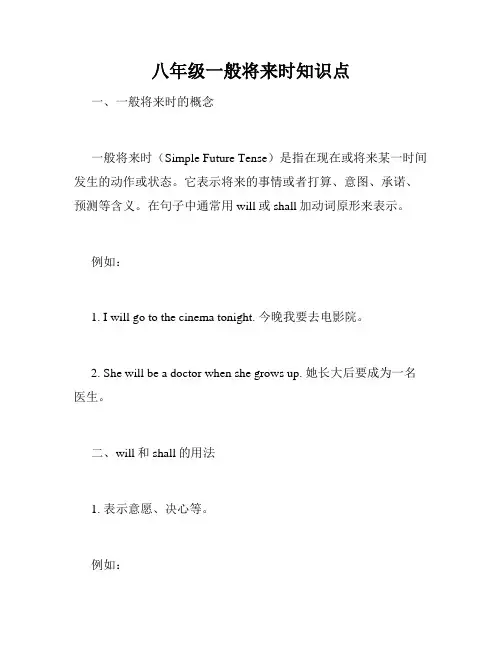
八年级一般将来时知识点一、一般将来时的概念一般将来时(Simple Future Tense)是指在现在或将来某一时间发生的动作或状态。
它表示将来的事情或者打算、意图、承诺、预测等含义。
在句子中通常用will或shall加动词原形来表示。
例如:1. I will go to the cinema tonight. 今晚我要去电影院。
2. She will be a doctor when she grows up. 她长大后要成为一名医生。
二、will和shall的用法1. 表示意愿、决心等。
例如:I will help you with your homework.我会帮你做作业。
2. 表示承诺或提议等用法。
例如:I shall be there on time.我会准时到那儿。
Shall we go to the park tomorrow?我们明天去公园好吗?3. 在口语中,will常用于表示将来事件。
例如:It will rain tomorrow.明天会下雨。
4. shall在现代英语中已经不常用,一般只在特殊疑问句或回答中使用。
例如:Shall I open the window?我该打开窗户吗?Yes, you shall.是的,你该打开。
三、构成方法形式:will / shall + 动词原形例如:I will go to Paris next month. 下个月我要去巴黎。
He shall be here soon. 他马上就要来了。
注意:一般将来时中,主语部分要与will或shall连用,不可以出现be动词或助动词do/does/did等。
四、常用的表示将来的时间状语1. tomorrow 明天例如:She will be back tomorrow. 她明天回来。
2. next week/month/year 下周/月/年例如:We will visit them next month. 我们下个月去探望他们。
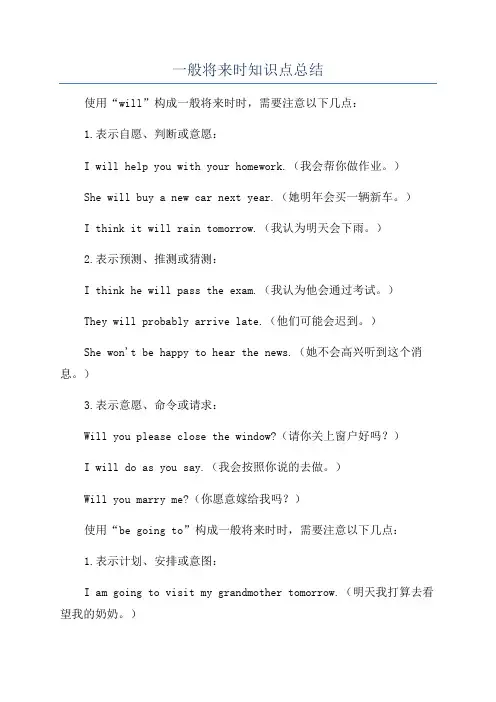
一般将来时知识点总结使用“will”构成一般将来时时,需要注意以下几点:1.表示自愿、判断或意愿:I will help you with your homework.(我会帮你做作业。
)She will buy a new car next year.(她明年会买一辆新车。
)I think it will rain tomorrow.(我认为明天会下雨。
)2.表示预测、推测或猜测:I think he will pass the exam.(我认为他会通过考试。
)They will probably arrive late.(他们可能会迟到。
)She won't be happy to hear the news.(她不会高兴听到这个消息。
)3.表示意愿、命令或请求:Will you please close the window?(请你关上窗户好吗?)I will do as you say.(我会按照你说的去做。
)Will you marry me?(你愿意嫁给我吗?)使用“be going to”构成一般将来时时,需要注意以下几点:1.表示计划、安排或意图:I am going to visit my grandmother tomorrow.(明天我打算去看望我的奶奶。
)They are going to have a party next week.(他们下周要举办一个派对。
)She is going to start a new job next month.(她下个月要开始一份新工作。
)2.表示根据现在的迹象、征兆或证据做出的判断:Look at those dark clouds. It is going to rain.(看那些乌云,要下雨了。
)He has a bad cough. He is going to be sick.(他咳嗽得厉害,快生病了。
)She is studying very hard. She is going to pass the exam.(她正在努力学习,一定会通过考试。
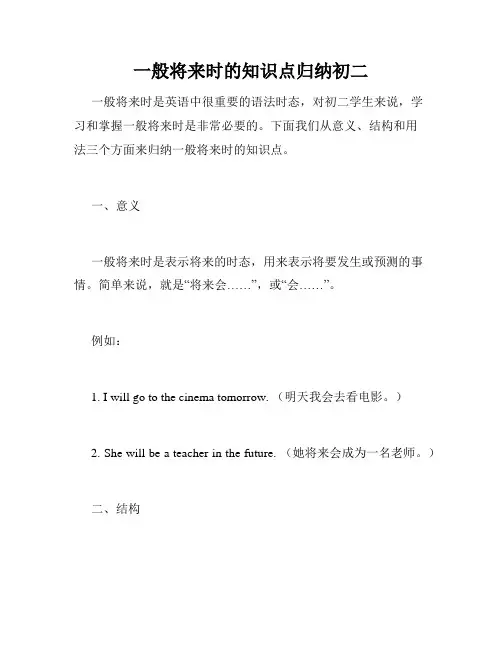
一般将来时的知识点归纳初二一般将来时是英语中很重要的语法时态,对初二学生来说,学习和掌握一般将来时是非常必要的。
下面我们从意义、结构和用法三个方面来归纳一般将来时的知识点。
一、意义一般将来时是表示将来的时态,用来表示将要发生或预测的事情。
简单来说,就是“将来会……”,或“会……”。
例如:1. I will go to the cinema tomorrow. (明天我会去看电影。
)2. She will be a teacher in the future. (她将来会成为一名老师。
)二、结构一般将来时的结构非常简单,只需要加上助动词“will”,然后加上动词的原形即可。
例如:I will study English at university.(我将会在大学里学英语。
)但是,动词“be”在将来时的形式是“will be”,比如:I will be happy. (我将会很开心。
)三、用法1. 表示将来发生的动作或事件例如:I will go to the party tonight. (今晚我会去参加派对。
)2. 表示将来的打算或意图例如:I will write a novel next year. (我明年打算写一本小说。
)3. 表示推测或预测例如:It will snow tomorrow. (明天会下雪。
)4. 表示请求例如:Will you help me with my homework, please? (请你帮帮我做作业好吗?)总之,初二学生需要掌握一般将来时,以便准确表达自己的想法和意图,也能听懂别人的语言表达。
同时,需要注意时态的正确运用,避免错误的表达和误解。
能够熟练掌握和灵活运用一般将来时,一定会为日后的英语学习打下坚实的基础。
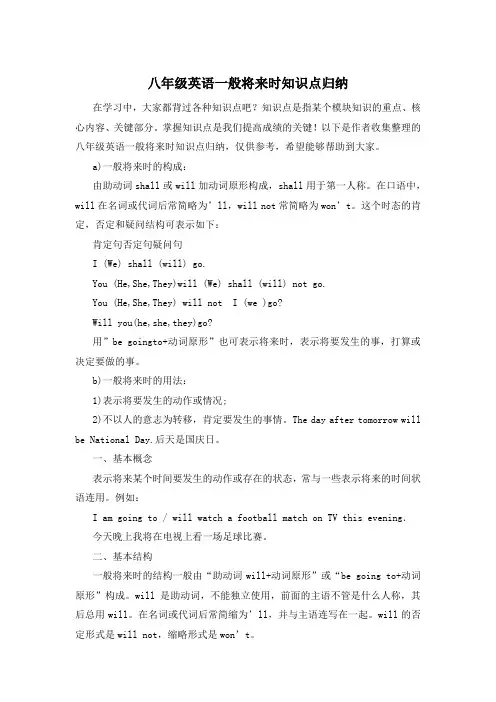
八年级英语一般将来时知识点归纳在学习中,大家都背过各种知识点吧?知识点是指某个模块知识的重点、核心内容、关键部分。
掌握知识点是我们提高成绩的关键!以下是作者收集整理的八年级英语一般将来时知识点归纳,仅供参考,希望能够帮助到大家。
a)一般将来时的构成:由助动词shall或will加动词原形构成,shall用于第一人称。
在口语中,will在名词或代词后常简略为’ll,will not常简略为won’t。
这个时态的肯定,否定和疑问结构可表示如下:肯定句否定句疑问句I (We) shall (will) go.You (He,She,They)will (We) shall (will) not go.You (He,She,They) will not I (we )go?Will you(he,she,they)go?用”be goingto+动词原形”也可表示将来时,表示将要发生的事,打算或决定要做的事。
b)一般将来时的用法:1)表示将要发生的动作或情况;2)不以人的意志为转移,肯定要发生的事情。
The day after tomorrow will be National Day.后天是国庆日。
一、基本概念表示将来某个时间要发生的动作或存在的状态,常与一些表示将来的时间状语连用。
例如:I am going to / will watch a football match on TV this evening.今天晚上我将在电视上看一场足球比赛。
二、基本结构一般将来时的结构一般由“助动词will+动词原形”或“be going to+动词原形”构成。
will是助动词,不能独立使用,前面的主语不管是什么人称,其后总用will。
在名词或代词后常简缩为’ll,并与主语连写在一起。
will的否定形式是will not,缩略形式是won’t。
三、时间状语一般将来时常用的时间状语:tomorrow, tonight, the day after tomorrow, next week (month, year …), this afternoon, evening …, soon, in the year 2024, in + 时间段等。
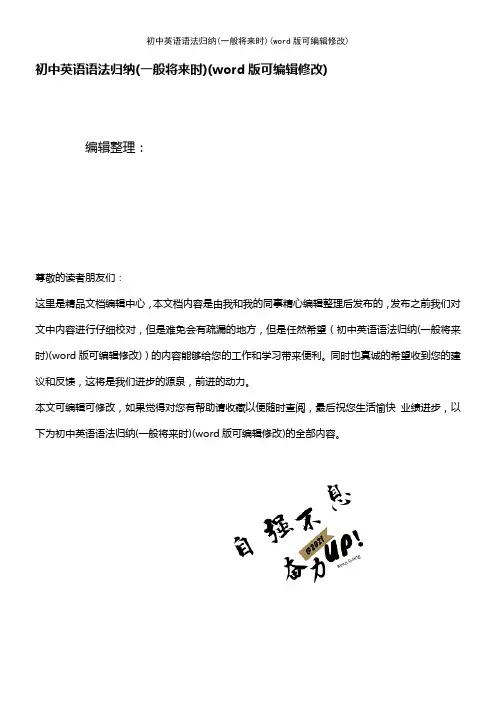
初中英语语法归纳(一般将来时)(word版可编辑修改)编辑整理:尊敬的读者朋友们:这里是精品文档编辑中心,本文档内容是由我和我的同事精心编辑整理后发布的,发布之前我们对文中内容进行仔细校对,但是难免会有疏漏的地方,但是任然希望(初中英语语法归纳(一般将来时)(word版可编辑修改))的内容能够给您的工作和学习带来便利。
同时也真诚的希望收到您的建议和反馈,这将是我们进步的源泉,前进的动力。
本文可编辑可修改,如果觉得对您有帮助请收藏以便随时查阅,最后祝您生活愉快业绩进步,以下为初中英语语法归纳(一般将来时)(word版可编辑修改)的全部内容。
初中英语语法归纳:一般将来时英语语法一般将来时表示将来某个时间要发生的动作,事情或存在的状态,也表示将来经常或反复发生的动作或事情。
那么,英语一般将来时的句子结构和语法特点是怎样的呢?下面为您讲解一下。
1)will/shall+动词原形 shall用于第一人称,常被will 所代替。
will 在陈述句中用于各人称,在征求意见时常用于第二人称。
will not=won’t shall not=shan’t例如:Which paragraph shall I read first? 我先读哪一段呢?Will you be at home at seven this evening?今晚七点回家好吗?2) be going to +不定式,表示将来。
a. 主语的意图,即将做某事。
例如:What are you going to do tomorrow? 明天打算作什么呢?b. 计划,安排要发生的事。
例如:The play is going to be produced next month.这出戏下月开播。
c。
有迹象要发生的事。
例如:Look at the dark clouds, there is going to be a storm. 看那乌云,快要下雨了.3) be +不定式表将来,按计划或正式安排将发生的事.例如:We are to discuss the report next Saturday。
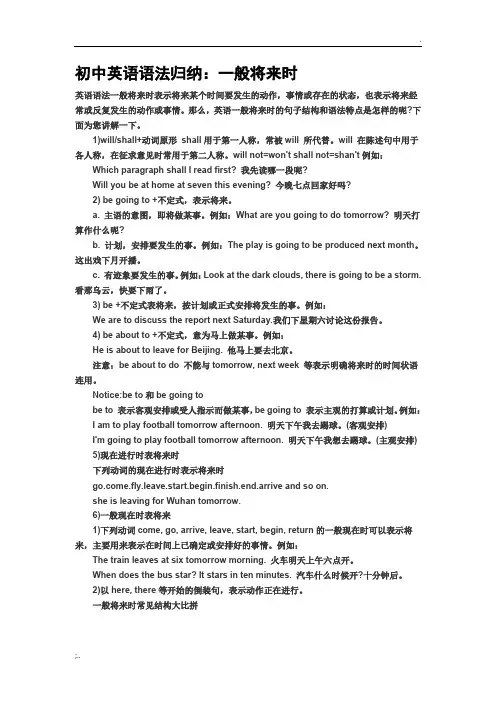
初中英语语法归纳:一般将来时英语语法一般将来时表示将来某个时间要发生的动作,事情或存在的状态,也表示将来经常或反复发生的动作或事情。
那么,英语一般将来时的句子结构和语法特点是怎样的呢?下面为您讲解一下。
1)will/shall+动词原形shall用于第一人称,常被will 所代替。
will 在陈述句中用于各人称,在征求意见时常用于第二人称。
will not=won't shall not=shan't例如:Which paragraph shall I read first? 我先读哪一段呢?Will you be at home at seven this evening? 今晚七点回家好吗?2) be going to +不定式,表示将来。
a. 主语的意图,即将做某事。
例如:What are you going to do tomorrow? 明天打算作什么呢?b. 计划,安排要发生的事。
例如:The play is going to be produced next month。
这出戏下月开播。
c. 有迹象要发生的事。
例如:Look at the dark clouds, there is going to be a storm. 看那乌云,快要下雨了。
3) be +不定式表将来,按计划或正式安排将发生的事。
例如:We are to discuss the report next Saturday.我们下星期六讨论这份报告。
4) be about to +不定式,意为马上做某事。
例如:He is about to leave for Beijing. 他马上要去北京。
注意:be about to do 不能与tomorrow, next week 等表示明确将来时的时间状语连用。
Notice:be to和be going tobe to 表示客观安排或受人指示而做某事,be going to 表示主观的打算或计划。
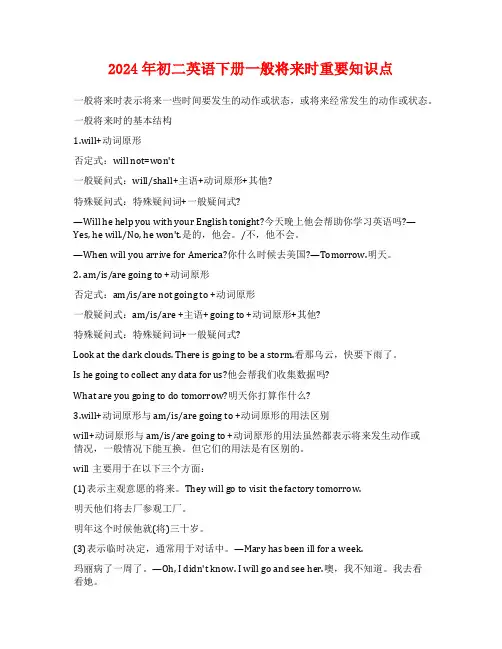
2024年初二英语下册一般将来时重要知识点一般将来时表示将来一些时间要发生的动作或状态,或将来经常发生的动作或状态。
一般将来时的基本结构1.will+动词原形否定式:will not=won't一般疑问式:will/shall+主语+动词原形+其他?特殊疑问式:特殊疑问词+一般疑问式?—Will he help you with your English tonight?今天晚上他会帮助你学习英语吗?—Yes, he will./No, he won't.是的,他会。
/不,他不会。
—When will you arrive for America?你什么时候去美国?—Tomorrow.明天。
2. am/is/are going to +动词原形否定式:am/is/are not going to +动词原形一般疑问式:am/is/are +主语+ going to +动词原形+其他?特殊疑问式:特殊疑问词+一般疑问式?Look at the dark clouds. There is going to be a storm.看那乌云,快要下雨了。
Is he going to collect any data for us?他会帮我们收集数据吗?What are you going to do tomorrow?明天你打算作什么?3.will+动词原形与am/is/are going to +动词原形的用法区别will+动词原形与am/is/are going to +动词原形的用法虽然都表示将来发生动作或情况,一般情况下能互换。
但它们的用法是有区别的。
will主要用于在以下三个方面:(1)表示主观意愿的将来。
They will go to visit the factory tomorrow.明天他们将去厂参观工厂。
明年这个时候他就(将)三十岁。
(3)表示临时决定,通常用于对话中。
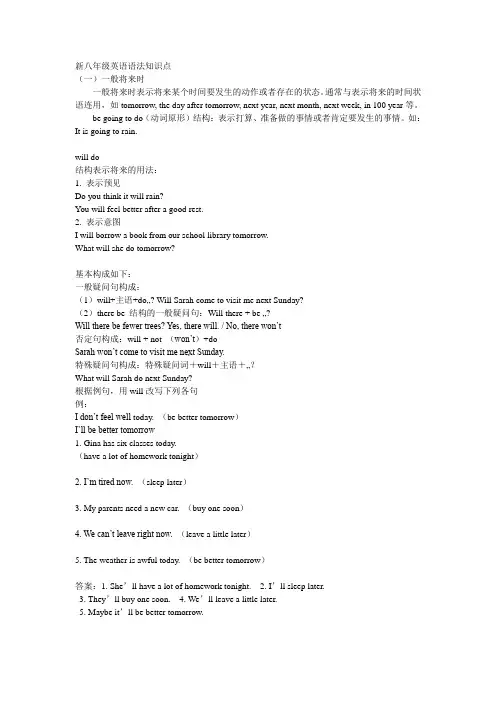
新八年级英语语法知识点(一)一般将来时一般将来时表示将来某个时间要发生的动作或者存在的状态。
通常与表示将来的时间状语连用,如tomorrow, the day after tomorrow, next year, next month, next week, in 100 year等。
be going to do(动词原形)结构:表示打算、准备做的事情或者肯定要发生的事情。
如:It is going to rain.will do结构表示将来的用法:1. 表示预见Do you think it will rain?You will feel better after a good rest.2. 表示意图I will borrow a book from our school library tomorrow.What will she do tomorrow?基本构成如下:一般疑问句构成:(1)will+主语+do…? Will Sarah come to visit me next Sunday?(2)there be 结构的一般疑问句:Will there + be …?Will there be fewer trees? Yes, there will. / No, there won’t否定句构成:will + not (won’t)+doSarah won’t come to visit me next Sunday.特殊疑问句构成:特殊疑问词+will+主语+…?What will Sarah do next Sunday?根据例句,用will改写下列各句例:I don’t feel well today. (be better tomorrow)I’ll be better tomorrow1. Gina has six classes today.(have a lot of homework tonight)_____________________________2. I’m tired now. (sleep later)__________________________3. My parents need a new car. (buy one soon)_____________________________4. We can’t leave right now. (leave a little later)_____________________________5. The weather is awful today. (be better tomorrow)_____________________________答案:1. She’ll have a lot of homework tonight. 2. I’ll sleep later.3. They’ll buy one soon.4. We’ll leave a little later.5. Maybe it’ll be better tomorrow.(二)should的用法:should用来提出建议和忠告,后边加动词原形,否定句直接在should后边加not.例如:I think you should eat less junk food. 我认为你应该少吃垃圾食品。

初二英语知识点总结(一)一般将来时一般将来时表示将来某个时间要发生的动作或者存在的状态。
通常与表示将来的时间状语连用,如tomorrow, the day after tomorrow, next year, next month, next week, in 100 years等。
be going to do (动词原形)结构:表示打算、准备做的事情或者肯定要发生的事情。
如:It is going to rain.will do 结构表示将来的用法:1. 表示预见Do you think it will rain?You will feel better after a good rest.2. 表示意图I will borrow a book from our school library tomorrow.What will she do tomorrow?基本构成如下:一般疑问句构成:(1)will+主语+do…? Will Sarah come to visit me next Sunday?(2)there be 结构的一般疑问句:Will there + be …?Will there be fewer trees? Yes, there will. / No, there won’t否定句构成:will + not (won’t)+doSarah won’t come to visit me next Sunday.特殊疑问句构成:特殊疑问词+will+主语+…?What will Sarah do next Sunday?根据例句,用will改写下列各句例:I don’t feel well today. (be better tomorrow)I’ll be better tomorrow.1. Gina has six classes today. (have a lot of homework tonight)_____________________________2. I’m tired now. (sleep later)_____________________________3. My parents need a new car. (buy one soon)_____________________________4. We can’t leave right now. (leave a little later)_____________________________5. The weather is awful today. (be better tomorrow)_____________________________答案:1. She’ll have a lot of homework tonight.2. I’ll sleep later.3. They’ll buy one soon.4. We’ll leave a little later.5. Maybe it’ll be better tomorrow.(二)should的用法:should用来提出建议和忠告,后边加动词原形,否定句直接在should后边加not.例如:I think you should eat less junk food.我认为你应该少吃垃圾食品。
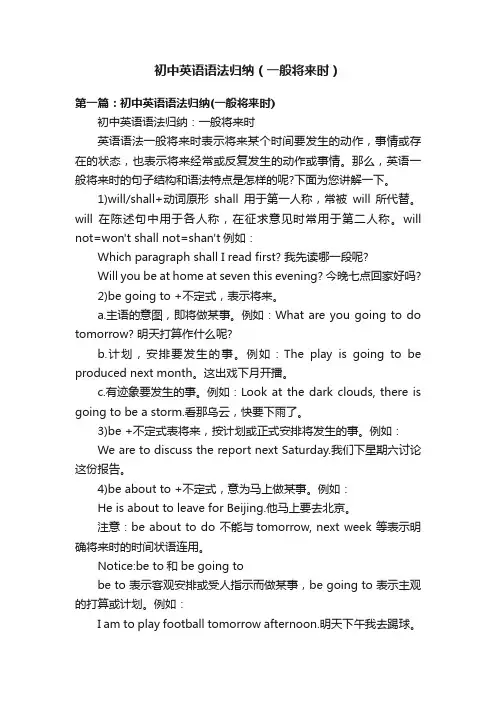
初中英语语法归纳(一般将来时)第一篇:初中英语语法归纳(一般将来时)初中英语语法归纳:一般将来时英语语法一般将来时表示将来某个时间要发生的动作,事情或存在的状态,也表示将来经常或反复发生的动作或事情。
那么,英语一般将来时的句子结构和语法特点是怎样的呢?下面为您讲解一下。
1)will/shall+动词原形shall用于第一人称,常被will 所代替。
will 在陈述句中用于各人称,在征求意见时常用于第二人称。
will not=won't shall not=shan't例如:Which paragraph shall I read first? 我先读哪一段呢?Will you be at home at seven this evening? 今晚七点回家好吗?2)be going to +不定式,表示将来。
a.主语的意图,即将做某事。
例如:What are you going to do tomorrow? 明天打算作什么呢?b.计划,安排要发生的事。
例如:The play is going to be produced next month。
这出戏下月开播。
c.有迹象要发生的事。
例如:Look at the dark clouds, there is going to be a storm.看那乌云,快要下雨了。
3)be +不定式表将来,按计划或正式安排将发生的事。
例如:We are to discuss the report next Saturday.我们下星期六讨论这份报告。
4)be about to +不定式,意为马上做某事。
例如:He is about to leave for Beijing.他马上要去北京。
注意:be about to do 不能与tomorrow, next week 等表示明确将来时的时间状语连用。
Notice:be to和be going tobe to 表示客观安排或受人指示而做某事,be going to 表示主观的打算或计划。
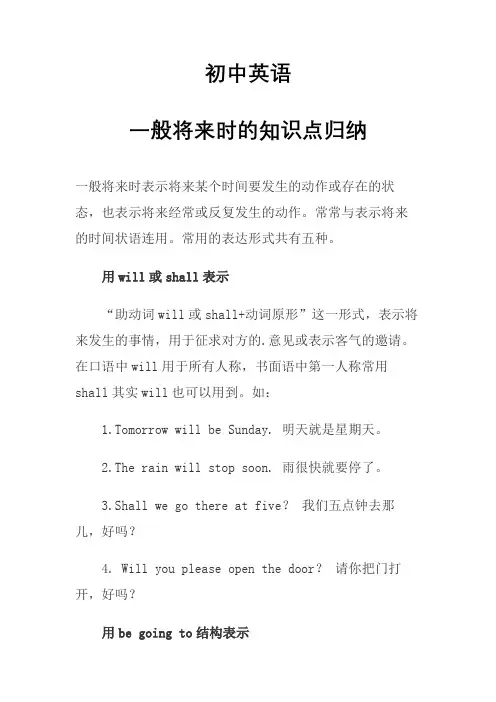
初中英语一般将来时的知识点归纳一般将来时表示将来某个时间要发生的动作或存在的状态,也表示将来经常或反复发生的动作。
常常与表示将来的时间状语连用。
常用的表达形式共有五种。
用will或shall表示“助动词will或shall+动词原形”这一形式,表示将来发生的事情,用于征求对方的.意见或表示客气的邀请。
在口语中will用于所有人称,书面语中第一人称常用shall其实will也可以用到。
如:1.Tomorrow will be Sunday. 明天就是星期天。
2.The rain will stop soon. 雨很快就要停了。
3.Shall we go there at five?我们五点钟去那儿,好吗?4. Will you please open the door?请你把门打开,好吗?用be going to结构表示“be going to+动词原形”用来表示近期或事先考虑过的将要发生的动作以及已有迹象表明必将发生某事,意为“打算;就要”。
如:1.We're going to meet outside the school gate. 我们打算在校门口见面。
2.Look! It's going to rain. 瞧!快下雨了。
用现在进行时表示表示位置转移的动词(如:go, come, leave,start, arrive等),可用现在进行时表示将来时。
如:1. Uncle Wang is coming. 王叔叔就要来了。
2. They're leaving for Beijing. 他们即将前往北京。
用一般现在时表示根据规定或时间表预计要发生的动作,在时间和条件状语从句中,都可用一般现在时表示将来时。
如:1. The new term starts (begins) on August29th. 新学期八月二十九日开学。
2. If it doesn't rain tomorrow, we will go out for a picnic. 如果明天不下雨,我们将出去野餐。
一般将来时语法知识点总结一般将来时是表示将来发生的动作或状态的一种时态。
一般将来时的构成由助动词“will”(或情态动词“shall”在第一人称单数中)+动词的原形组成。
以下是一般将来时的相关知识点总结:1. 肯定句结构:主语 + will + 动词原形 + 其他。
例如:- I will go to the movies tomorrow.(我明天会去看电影。
)- She will help you with your homework.(她会帮你做作业。
)2. 否定句结构:主语 + will not / won't + 动词原形 + 其他。
例如:- They won't come to the party.(他们不会来参加派对。
)- He will not eat meat anymore.(他不再吃肉了。
)3. 疑问句结构:Will + 主语 + 动词原形 + 其他?例如:- Will you join us for dinner?(你会和我们一起吃晚饭吗?)- Will they visit their grandparents this weekend?(他们会在这个周末去看望他们的祖父母吗?)4. 表示计划或意愿:表示将来的某个时间或做某件事情的打算或意愿。
例如:- I will study abroad next year.(我明年将出国留学。
)- They will buy a new car soon.(他们很快会买一辆新车。
)5. 表示预测或推断:表示将来的某个状态或事件可能发生,基于推测或判断。
例如:- It will rain tomorrow.(明天会下雨。
)- She will probably pass the exam.(她可能会通过考试。
)需要注意的是,一般将来时有时可用于表示即将发生的动作,而不一定是将来的某个时间。
例如,当说话人决定或做出决定时,也可以使用一般将来时。
初二英语知识点归纳:一般将来时初二英语知识点归纳:一般将来时1. 用一般现在时表示将来的时间的用法这种用法除了动词be外,一般适用于表示位置转移的动词或表示根据规定或时间表上预计要发生的动作或事态。
此外,在由“if , when , as soon as , until , till , after , before”等引导的条件或时间状语从句中,若主句为将来时,从句通常用一般现在时表示将来的时间。
例如:A. I’m free this afternoon . 我今天下午有空。
B. School starts on September 1 . 学校9月1日开学。
2. be about+动词不定式结构的用法这种结构表示“最近或马上要发生的动作”。
例如: A.The meeting is about to begin . 会议马上开始 B.Summer harvest is about to start 夏收即将开始。
3. be+v. ing结构的用法这种结构表示按计划即将发生的动作,用进行时形式表示将来的时间,但只适用于表示位置移动的动词。
例如:go , come , leave , start , arrive , move , return , fly (乘飞机)等,并常伴有表示将来时间的状语以区别于进行时的动作。
例如:A. Where are you going this Saturday ? 这个星期六你准备去哪儿?B. The Greens are moving to another city the day after tomorrow . 格林一家后天要搬迁到另一个城市。
C. Mr . Li is flying to Shanghai tomorrow morning . 李先生明天早晨乘飞机去上海。
4.be+动词不定式结构的用法这种结构着重指按计划或安排将要发生某事。
常表示“职责、意图、约定、可能性”等。
【英语知识点】初二英语知识点整理归纳1.一般将来时表示将来某一时段的动作或状态,或将来某一段时间内经常的动作或状态。
2.常见结构(1)will / shall + 动词原形(否定句在will/shall后加not)。
I will go to the movies. 我要去看电影。
(2)be going to+动词原形。
We are going to Shanghai next Monday.下周一我们去上海。
(3)用于"I expect, I'm sure, I think, I wonder等的宾语从句"中。
Don't worry about the exam. I'm sure you'll pass.不要担心这次考试,我确信你会通过的。
(4)用于祈使句和陈述句中。
Work hard and you will succeed.如果你努力,就会成功的。
(5)与表示时间或条件的状语从句连用。
I'll let you know as soon as he arrives.他一到我就通知你。
1.不定代词是不指明代替任何特定名词或形容词的代词。
在句中可以作主语、宾语、表语、定语和状语。
2.常见的不定代词some 一些,某些,某个any一些,任何all 全体,所有both 全部,都none 无人或无either 两者之中的任何一个,这个或那个neither 两者都不each 每个,各自的every 每个,每一的,一切的neither 两个之中一个也不是other 其他的(a)few (a)little(几乎没有)有一些1.是指在句子中表示行为或状态特征的词,用以修饰动词、形容词、其他副词或全句,表示时间、地点、程度、方式等概念。
2.副词的分类(1)时间频率副词now,then,often,always,usually,next,lastday,already,ever,never等。
初二英语知识点归纳_八年级英语知识点汇总升入初二,英语越来越难了,想要学好英语,就要常对所学过的英语学问点进行归纳,下面我就来给大家共享初二英语学问点归纳,盼望对大家有所关心。
初二英语学问点归纳(一)一般将来时一般将来时表示将来某个时间要发生的动作或者存在的状态。
通常与表示将来的时间状语连用,如tomorrow, the day after tomorrow, next year, next month, next week, in 100 years等。
be going to do (动词原形)结构:表示准备、预备做的事情或者确定要发生的事情。
如:It is going to rain.will do 结构表示将来的用法:1. 表示预见Do you think it will rain?You will feel better after a good rest.2. 表示意图I will borrow a book from our school library tomorrow.What will she do tomorrow?基本构成如下:一般疑问句构成:(1)will+主语+do? Will Sarah come to visit me next Sunday?(2)there be 结构的一般疑问句:Will there + be ?Will there be fewer trees? Yes, there will. / No, there wont否定句构成:will + not (wont)+doSarah wont come to visit me next Sunday.特别疑问句构成:特别疑问词+will+主语+?What will Sarah do next Sunday?(二)should的用法:should用来提出建议和忠告,后边加动词原形,否定句直接在should后边加not.例如:I think you should eat less junk food.我认为你应当少吃垃圾食品。
初二英语知识点归纳:一般将来时
用一般现在时表示将来的时间的用法
这种用法除了动词be外,一般适用于表示位置转移的动词或表示根据规定或时间表上预计要发生的动作或事态。
此外,在由“if,hen,assoonas,until,till,after,before”等引导的条件或时间状语从句中,若主句为将来时,从句通常用一般现在时表示将来的时间。
例如:
A.I’freethisafternoon.
我今天下午有空。
B.SchoolstartsonSepteber1.
学校9月1日开学。
beabout+动词不定式结构的用法
这种结构表示“最近或马上要发生的动作”。
例如:
A.Theeetingisabouttobegin
会议马上开始
B.Suerharvestisabouttostart
夏收即将开始。
be+v.ing结构的用法
这种结构表示按计划即将发生的动作,用进行时形式表示将来的时间,但只适用于表示位置移动的动词。
例如:go,e,leave,start,arrive,ove,return,fly等,并常伴有表
示将来时间的状语以区别于进行时的动作。
例如:
A.hereareyougoingthisSaturday?
这个星期六你准备去哪儿?
B.TheGreensareovingtoanothercitythedayaftertoorro.
格林一家后天要搬迁到另一个城市。
c.r.LiisflyingtoShanghaitoorroorning.
李先生明天早晨乘飞机去上海。
be+动词不定式结构的用法
这种结构着重指按计划或安排将要发生某事。
常表示“职责、意图、约定、可能性”等。
例如:
A.youaretobebacby11o’cloc.
你必须11点回来。
B.earetoeetatthezoo.
我们约定在动物园见面。
c.Thefootballatchisnottobeplayedtoday.
今天不能举行足球比赛了。